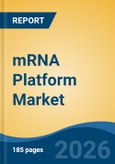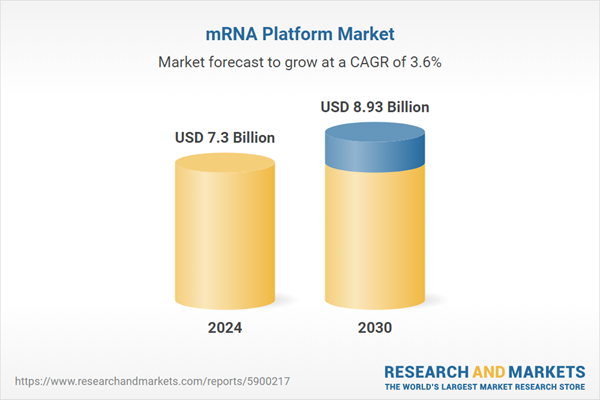Free Webex Call
The mRNA Platform Market was valued at USD 7.30 Billion in 2024 and is projected to reach USD 8.93 Billion by 2030, rising at a CAGR of 3.56%. The mRNA (messenger RNA) platform is an advanced biotechnological innovation that enables synthetic RNA molecules to deliver genetic instructions to cells, prompting the production of specific proteins. This approach has demonstrated significant success in vaccine development and is expanding into treatments for a range of diseases. Speak directly to the analyst to clarify any post sales queries you may have.
10% Free customizationThis report comes with 10% free customization, enabling you to add data that meets your specific business needs.
Notably, in September 2023, BioNTech SE partnered with CEPI to accelerate the development of an mRNA-based Mpox vaccine, underscoring the platform’s importance in preparing for emerging infectious threats. By mimicking the natural role of RNA in the body, synthetic mRNA sequences are engineered to prompt immune responses or support therapeutic protein production. These technologies are increasingly adopted due to their adaptability, speed of development, and effectiveness, particularly in public health emergencies and personalized medicine applications.
Key Market Drivers
Technological Advancements
Advances in lipid nanoparticle (LNP) delivery systems have enhanced the stability and cellular uptake of mRNA molecules, improving their efficacy. These innovations were instrumental in the success of COVID-19 mRNA vaccines. Modified mRNA sequences are now more stable and less immunogenic, extending vaccine shelf life and easing distribution. For example, Sanofi launched a new mRNA research facility at Griffith University in November 2023 to accelerate drug development.Techniques like codon optimization are being refined to maximize protein expression, while synthetic biology tools such as CRISPR-Cas9 allow precise mRNA sequence design for targeted therapies. The development of cost-efficient and scalable manufacturing has also improved the availability of mRNA products during global health crises. Furthermore, enhancements in cold chain logistics and stability at varied temperature ranges reduce dependency on ultra-cold storage. The integration of next-generation sequencing supports precise and rapid design of mRNA-based treatments, enabling therapeutic applications across a broad range of indications.
Key Market Challenges
Vaccine Hesitancy and Misinformation
A critical challenge facing the Global mRNA Platform Market is vaccine hesitancy, fueled by misinformation. Despite scientific validation, concerns around safety, efficacy, and long-term impacts have hindered vaccine uptake. Social media platforms are often sources of misinformation, influencing public perception and eroding confidence in mRNA-based vaccines. This hesitancy can reduce immunization rates, hampering efforts to achieve herd immunity and prolonging outbreaks of preventable diseases. Public mistrust also complicates health campaigns during emergencies, such as pandemics, and may extend skepticism to other public health measures. Low vaccine coverage due to hesitancy not only affects individual health outcomes but also increases pressure on healthcare systems and obstructs disease control efforts at a population level.Key Market Trends
Increase in the Number of Virtual Trials
The rise of virtual trials is reshaping drug development strategies, including those related to mRNA therapies. Virtual trials use digital platforms for remote data collection, reducing dependence on physical sites and expanding access to more diverse participant populations. CROs and pharmaceutical companies are increasingly adopting technologies such as telemedicine, wearable sensors, and mobile health apps to monitor patient outcomes in real-time. This approach enhances patient engagement, accelerates trial timelines, and reduces operational costs. The decentralized model is proving particularly effective for vaccines and therapies that require global outreach, supporting rapid data acquisition and streamlined regulatory submissions.Key Players Profiled in this mRNA Platform Market Report
- AstraZeneca PLC
- Asuragen, Inc.
- Catalent Pharma Solutions
- Arcturus Therapeutics, Inc.
- BioNTech AG
- CRISPR Therapeutics Inc.
- AKESOgen, Inc.
- baseclick GmbH
- Accent Therapeutics Inc.
- Accanis Biotech F&E GmbH & Co KG
Report Scope:
In this report, the Global mRNA Platform Market has been segmented into the following categories, in addition to the industry trends which have also been detailed below:mRNA Platform Market, by Indication:
- Autoimmune Diseases
- Cancer
- Personalized Treatment
- Single Cancer Focused
- Infectious Diseases
- Rare Diseases
- Respiratory Diseases
mRNA Platform Market, by Usability:
- Prophylactic Vaccines
- Therapeutic Drugs
- Therapeutic Vaccines
mRNA Platform Market, by mRNA Type:
- Nucleoside-Modified mRNA
- Self-Amplifying mRNA
- Unmodified mRNA
mRNA Platform Market, by End-User:
- Hospitals & Clinics
- Pharmaceutical Companies
- Research Organization
mRNA Platform Market, by Region:
- North America
- United States
- Canada
- Mexico
- Asia-Pacific
- China
- India
- South Korea
- Australia
- Japan
- Europe
- Germany
- France
- United Kingdom
- Spain
- Italy
- South America
- Brazil
- Argentina
- Colombia
- Middle East & Africa
- South Africa
- Saudi Arabia
- UAE
Competitive Landscape
Company Profiles: Detailed analysis of the major companies present in the Global mRNA Platform Market.Available Customizations:
With the given market data, the publisher offers customizations according to a company's specific needs. The following customization options are available for the report.Company Information
- Detailed analysis and profiling of additional market players (up to five).
This product will be delivered within 1-3 business days.
Table of Contents
1. Product Overview
2. Research Methodology
3. Executive Summary
5. Global mRNA Platform Market Outlook
6. Asia Pacific mRNA Platform Market Outlook
7. Europe mRNA Platform Market Outlook
8. North America mRNA Platform Market Outlook
9. South America mRNA Platform Market Outlook
10. Middle East and Africa mRNA Platform Market Outlook
11. Market Dynamics
12. Market Trends & Developments
14. Porter’s Five Forces Analysis
16. Competitive Landscape
Companies Mentioned
The leading companies profiled in this mRNA Platform market report include:- AstraZeneca PLC
- Asuragen, Inc.
- Catalent Pharma Solutions
- Arcturus Therapeutics, Inc.
- BioNTech AG
- CRISPR Therapeutics Inc.
- AKESOgen, Inc.
- baseclick GmbH
- Accent Therapeutics Inc.
- Accanis Biotech F&E GmbH & Co KG
Table Information
| Report Attribute | Details |
|---|---|
| No. of Pages | 180 |
| Published | May 2025 |
| Forecast Period | 2024 - 2030 |
| Estimated Market Value ( USD | $ 7.3 Billion |
| Forecasted Market Value ( USD | $ 8.93 Billion |
| Compound Annual Growth Rate | 3.5% |
| Regions Covered | Global |
| No. of Companies Mentioned | 11 |









